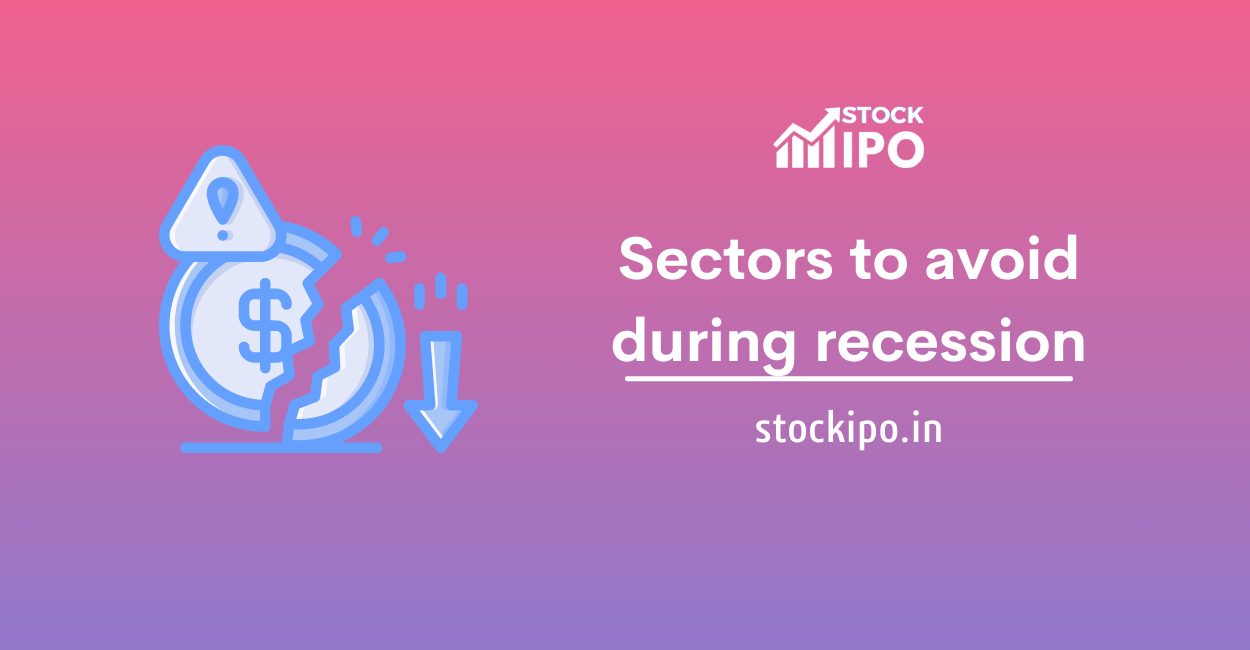The very mention of the term “recession” may cause widespread panic. Thousands of people lose their jobs, the economy suffers, and a pervasive sense of gloom and negativity sets in during this period.
During A Recession, What Occurs?
A shaky stock market is a leading indicator of a coming economic downturn. The GDP falls by a large amount. Less is being produced, unemployment is rising, and inflation is rising. To rephrase, when inflation rises, and incomes fall, more and more things become out of reach.
Company valuations fall as a result. People are selling their assets and hoarding cash. The persistent selling causes stock values to decline even more quickly.
The stock market at these times is a veritable slaughterhouse. Everything you see is awash in crimson. Stocks drop for even the best-performing corporations.
Stocks Most Vulnerable To A Recession
During a recession, it may be just as vital for an investor to know which assets to avoid as it is to know which firms make excellent investments. In a downturn, high-risk investments and enterprises include heavily indebted, cyclical, or speculative.
1. Organizations With Lots Much Debt
Most investors should stay away from highly leveraged firms with massive debt burdens during a recession. These businesses often have an unsustainable DE ratio because of the hefty interest payments they must make.
Debt service is a major problem for these businesses, suffering from the income drop that the crisis has brought about. Businesses with a lot of debt are more likely to fail (or at least have their stock value plummet).
2. Markets for Cyclical Stocks
Recessions are particularly hard for cyclical equities because they rely on factors like employment and consumer confidence. In prosperous times, cyclical stocks tend to perform well when people have more money to spend on luxuries and other non-essentials. Companies that produce luxury goods such as automobiles, furniture, and apparel are good examples.
However, when the economy is doing poorly, people tend to cut down on spending on things like entertainment and dining out. They cut down on expenses for vacations, eating out, and entertainment. As a result, cyclical equities in these sectors tend to underperform and lose their appeal to investors in a down economy.
3. Futures and Options on Stocks
Speculative equities have inflated prices because investors are optimistic about their future returns. This confidence is tested during recessions when these investments often perform the poorest.
Investors hoping to get in on the ground floor of the next great investment opportunity typically gravitate to speculative equities, which still need to demonstrate their worth. It is common for these high-risk equities to collapse rapidly during a recession as investors flee the market and seek safe-haven assets that reduce their risk exposure.
During A Downturn, How Do You Choose Your Investment Strategy?
Look For Stocks In Fundamental Industries
Intuitively, you may want to sell your stocks when the economy is in a downturn, but financial professionals advise against doing so. When the economy as a whole is faltering, there are usually a select few industries that manage to keep moving forward and reward investors with consistent profits.
Therefore, the healthcare, utility, and consumer goods sectors are strong bets if you want to use equities to buffer your portfolio during a recession. Without the health of the economy, people will continue to spend money on necessities like food, utilities, medicine, and home goods. Therefore, these equities usually do well during market downturns (and underperform during booms).
Pay Attention to Stocks That Pay Consistent Dividends
Purchasing dividend stocks is viable for anyone looking to build a passive income stream. Some experts recommend looking for firms with low debt-to-equity ratios and robust balance sheets when considering dividend stocks.
Dividend aristocrats might be a good start if you’re overwhelmed. These corporations have raised dividend payments for the last 25 years.
Real Estate Investment Should Be Considered
Homeowners’ worst dread came true in 2008 when the property market crashed. The housing market crashed, yet it became a bonanza for certain investors. When property prices tend to fall, investing in real estate during a recession may sometimes provide a profit.
Finding a dependable renter to rent your home can provide a stable revenue stream to help you get through tough economic times. You may make a profit by selling the property if prices recover.
Put Money Into Precious Metals
Gold and silver, being precious metals, are usually safe havens during economic downturns. However, in times of economic distress, there is often a corresponding rise in demand for such goods, leading to price hikes.
The simplest option is buying coins or bars from a vendor or a coin dealer. This is not the same as investing in a security, but it is functionally equivalent.
Focus on exchange-traded funds (ETFs) if investing in precious metals is your primary goal. Investing in precious metals is a good example of a single industry fund, a collection of investments all made inside a single industry. Gold IRAs are available for those who want to save more for retirement.
Reduce Your Spending And Improve Your Savings
Examine your current spending patterns and formulate a strategy to save more money as a first step. In the case of a sudden lack of income, a layoff, or other unforeseen circumstances like a rise in food or gas prices, having an emergency fund in place may help you weather the financial storm. You should have enough money saved up to last you for at least six months in case of an emergency.
Furthermore, persons with access to cash are better positioned to take advantage of investment opportunities during recessions, which may greatly improve their financial situations over the long run.
Bottom Line
Worrying about a potential economic downturn is unnecessary if you’re investing for the long term. You may have reached a point in your financial career when you want to cash out some of your gains. Although, generally speaking, you shouldn’t move while prices are low. You could imagine you’ll get back in after prices have stabilized, but you can’t know when that will be.
You should treat the trades you’ve already made as long-term investments instead. However, if you are in a position to invest, put your money into recession-resistant industries like healthcare, utilities, and consumer staples. Long-term dividend payers are also a solid option since they are often stable, established businesses that can weather a market downturn.







